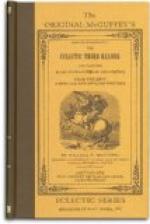[Illustration: Mother rocking daughter.]
My mother.
[Illustration: Script Exercise:
Hark! My mother’s voice I hear,
Sweet that voice is to my ear;
Ever soft, it seems to tell,
Dearest child, I love thee well.
Love me, mother? Yes, I know
None can love so well as thou.
Was it not upon thy breast
I was taught to sleep and rest?
Didst thou not, in hours of pain,
Lull this head to ease again?
With the music of thy voice,
Bid my little heart rejoice?
Ever gentle, meek and mild,
Thou didst nurse thy fretful child.
Teach these little feet the road
Leading on to heaven and God.
What return then can I make?
This fond heart, dear mother take;
Thine its, in word and thought,
Thine by constant kindness bought.
]
LESSON LX.
skip’ping mean George gift en gaged’ Mason El’let
THE BROKEN WINDOW.
1. George Ellet had a bright silver dollar for a New-year gift.
2. He thought of all the fine things he might buy with it.
3. The ground was all covered with snow; but the sun shone out bright, and everything looked beautiful.
4. So George put on his hat, and ran into the street. As he went skipping along, he met some boys throwing snowballs. George soon engaged in the sport.
5. He sent a ball at James Mason, but it missed him, and broke a window on the other side of the street.
6. George feared some one would come out of the house and find him. So he ran off as fast as he could.
[Illustration: Boy throwing snowball through window.]
7. As soon as he got round the next corner, George stopped, because he was very sorry for what he had done.
8. He said to himself, “I have no right to spend my silver dollar, now. I ought to go back, and pay for the glass I broke with my snowball.”
9. He went up and down the street, and felt very sad. He wished very much to buy something nice. He also wished to pay for the broken glass.
10. At last he said, “It was wrong to break the window, though I did not mean to do it. I will go and pay for it, if it takes all my money, I will try not to be sorry. I do not think the man will hurt me if I pay for the mischief I have done.”
LESSON LXI.
mer’chant hon’est ly rang mind
part’ner with out’ rich bell
THE BROKEN WINDOW. (CONCLUDED.)
1. George started off, and felt much happier for having made up his mind to do what was right.
2. He rang the doorbell. When the man came out, George said, “Sir, I threw a snowball through your window. But I did not intend to do it. I am very sorry, and wish to pay you. Here is the dollar my father gave me as a New-year gift.”




